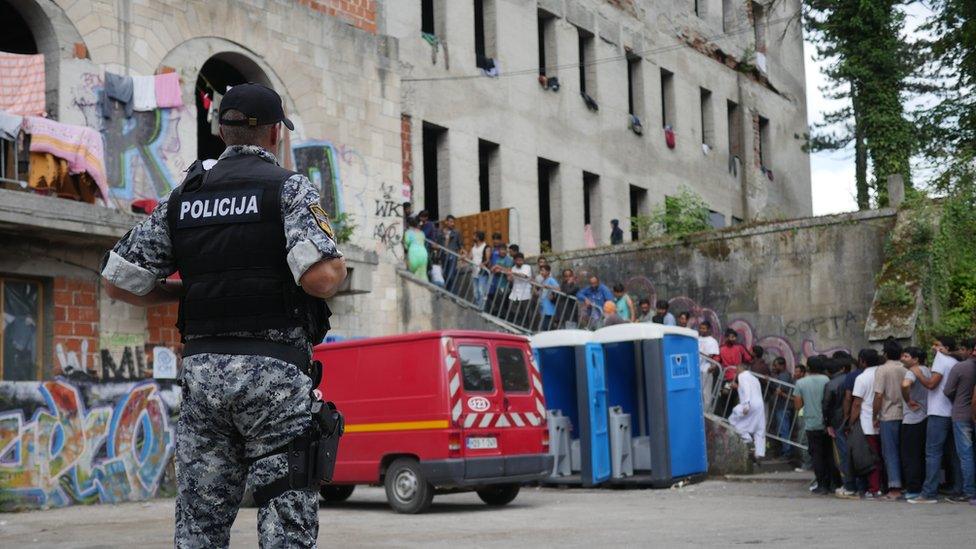For refugees in Bosnia, a bombed ruin is the only refuge
- Published

Their distinctive, bright blue bibs make workers from the UN's refugee agency a magnet for frustration, as they try to make their way through a bombed-out student dormitory in the city of Bihac, in Bosnia-Herzegovina.
An Afghan family want to talk to them about their chances of making it to Western Europe.
A young man from Kazakhstan tells them he wants to go home.
Then there is Khalid, a teacher from Syria, who has reached the end of his tether.
"Why don't you do your job, your duty?" he asks as he waves his passport at Francesca Bonelli, the UNHCR's deputy regional representative.
Bosnia was largely unaffected by the massive wave of migration along the so-called Balkan Route in 2015.
But now people are arriving in significant numbers as they try to make their way to European Union countries despite the tight controls at border crossings.
Khalid complains bitterly of police harassment and a lack of help from Bosnian authorities.
"Don't tell me that this country is very poor," he says. "This country is very rich - you can see the trees, the water - but the government is very bad."
He is among a group who have made their way to the shattered dormitory in the absence of any other accommodation.
Like others here - many from refugee-producing countries including Iraq, Afghanistan and Iran as well as Syria - he views the UN refugee agency as an all-powerful authority that should be able to provide better conditions.
And he is surprised and disarmed to discover that Francesca Bonelli shares his frustrations.
"It is very challenging, trying to support the government and Bosnian society," she says.
Ms Bonelli explains that, like Khalid, the UNHCR workers are also guests in Bosnia. So, while the agency can offer the government logistical support and expertise, it has no power to impose unilateral solutions.
"There are no proper services to provide dignified conditions. There are families, children, elderly people, pregnant ladies; they need immediate support. They are fleeing conflict, looking for protection - and we need to provide for their urgent needs."
But getting anything done in Bosnia is a complicated matter. The country is divided into two "entities", Republika Srpska and the Federation, with most ethnic-Serbs living in the former and most Bosniak Muslims and Croats in the latter.
The federal government is weak and nationalist leaders pursue a strategy of divide and rule.
That means the recent arrivals in Bihac have largely been left to fend for themselves.
"I would define the number of migrants in Bihac as a crisis, because our capacities are meagre and not sufficient to respond," says Amira Hadzimehmedovic of the International Organization for Migration.
"Politically it's difficult. We had a war, we haven't recovered completely to be a stable enough country to respond to these problems," Ms Hadzimehmedovic explains.
Bihac is close to the border with Croatia, a member of the European Union. The town has become an obvious gathering place for people before they make attempts to cross the frontier or when they return from unsuccessful trips.
Local authorities say the federal government's refugee agency should be responsible for providing accommodation. But, in the absence of any coordinated action, the city stepped in with the offer of the dilapidated dormitory.
The windows are all gone, rain comes through the roof and there are holes in the floor: grim reminders of shell impacts during the siege of Bihac in the 1990s. People sleep on the bare concrete or in simple tents inside the structure, even though the entire place stinks of urine.
The president of the local authority, Davor Zupa, admits it is far from ideal.
"The situation has been distressing for some time now," he says.
"I can only guess at the Government's motives. I feel they've been caught off guard and haven't properly understood the gravity of the situation facing Bihac and Bosnia in general," says Mr Zupa.
The UN refugee agency says it's working to move some of the more vulnerable families to better conditions. But for now hundreds of people are still staying in the dormitory.
If previous summers are anything to go by, arrivals are likely to increase. And if Bosnia cannot cope with the numbers now, the situation could quickly go from unpleasant to unsustainable.
All photos taken by Guy Delauney.
- Published5 days ago
- Published29 November 2022
- Published19 November 2017